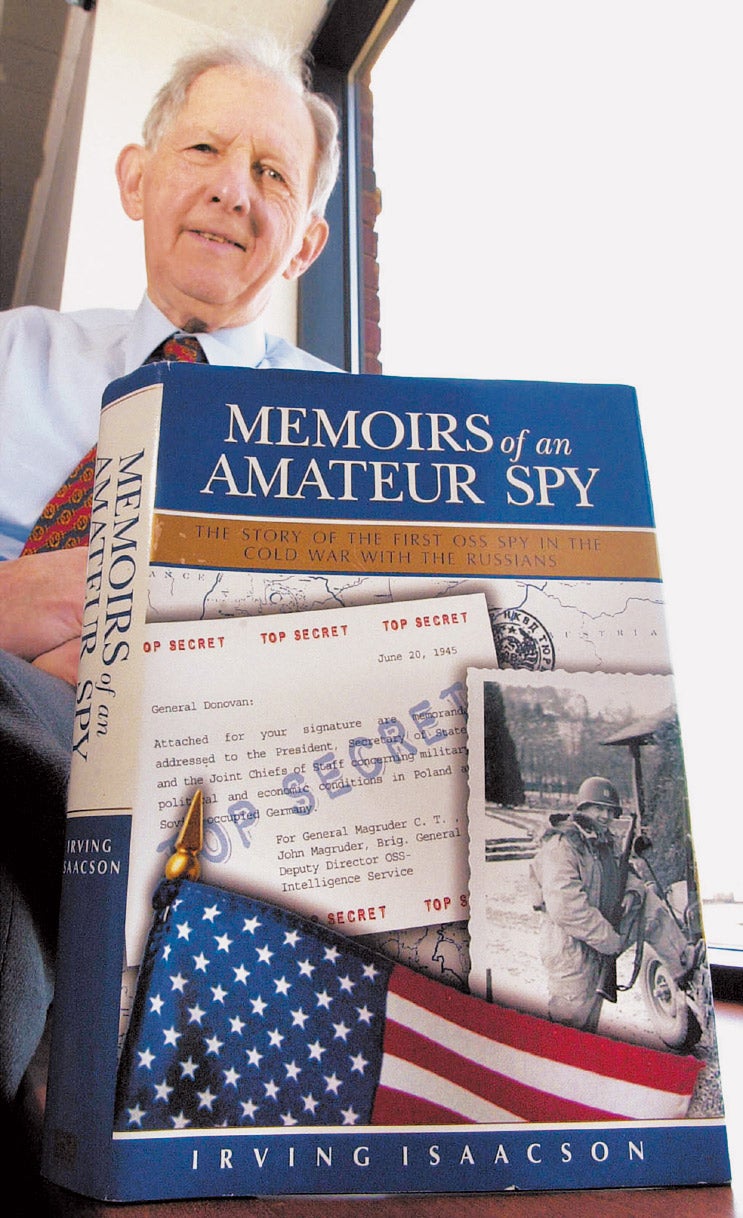For most of his life, Irving “Ike” Isaacson ’39 has practiced law in Lewiston, Maine. It’s been steady work, and a career he’s proud of. But he’s equally proud of what he accomplished nearly 60 years ago, something hardly anyone knew about. In fact, until recently, neither did he.
Isaacson’s recently published autobiography, “Memoirs of an Amateur Spy” (Stones Point Press), tells of his training in the Office of Strategic Services and his espionage in Russian-occupied Poland shortly after World War II. Along the way, he meets a young woman and falls in love.
But Isaacson had no idea he had served as one of the first spies to work in the aftermath of V-E Day.
In 1944, poised to ship out to the Normandy battlefield, Isaacson was instead drafted into the OSS, the wartime precursor of the CIA. After parachute training, he spent five months in liberated Holland, where he smuggled agents and materials into enemy territory. It was a disordered, seat-of-the-pants operation, one in which he was often left without supervision. “Nobody around me had knowledge of what was going on,” said Isaacson. “I was still in the military, of course, but other than that, all my usual military guidelines seem to have disappeared. . . . The command echelon was not greatly concerned about commanding you.”
That suited Isaacson just fine: “I absolutely reveled in the openness and freedom that the OSS allowed its people.” After V-E Day in May 1945, Isaacson and a friend, Fred Switgall, traveled to Leipzig, Germany, to set up a spy ring against the Russians. Covering the countryside attempting to set up networks, they planned to recruit local Germans as agents and then send information back to the Americans. The mission never progressed: Securing Germans willing to act as U.S. spies was next to impossible. But Isaacson did get something out of the deal: a romance. He and Jutka Magyar, a Hungarian Jew and concentration camp survivor, married in Germany and are still together today. (The story of Jutka’s survival can be found in her own autobiography, “Seed of Sarah.”)
Still hungry for adventure, Isaacson and Switgall next dreamed up a plan to create an intelligence mission to Poland, an area then considered “the biggest, blackest intelligence hole in Europe.” No Americans had entered there since the war’s end. The two friends eventually covered some 1,600 miles. “We traveled through one country that was undergoing the pangs of birth, Poland, and through another, East Germany, that was being systematically bled to death,” Isaacson said. Upon his return, he produced a 24-page intelligence summary report. The report detailed, among other findings, the presence of Russians in the Polish Army; that some 90 percent of the population opposed Soviet occupation; that anti-Soviet feeling had increased due to economic privation and looting; and that Polish underground groups continued an armed resistance.
The OSS never told Isaacson what happened to that report. But years later, after doing the research for his book, Isaacson learned the report had been forwarded directly to President Truman, the secretary of state and the Joint Chiefs of Staff. The mission had provided the first main OSS intelligence on the entire area. After learning of the report’s whereabouts, dozens of years after the fact, “I was frankly amazed,” Isaacson said. “Going to Poland was our own idea; it wasn’t theirs. We could have just disappeared forever, and nobody would have checked up on us. I’m actually a little bit pissed off at the OSS. They could have said, ‘Great job,’ but they didn’t.”
The bitterness, however, is not what lasts. His time at the OSS, said Isaacson, “was the most exciting period of my life, and the most productive. I got married, too, which was great. I’m very thankful.”
